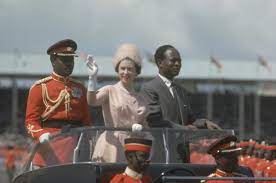From eulogies such as ‘towering stateswoman’ to the ‘queen of decolonisation’ Africans especially in Commonwealth countries have been paying moving tributes to Queen Elizabeth II who passed away in Balmoral, Scotland on Thursday at the age of 96.
Her death marks the end of an era, bringing the stint of the longest-serving British monarch to a close and sending millions of people in Britian, the Commonwealth and the rest of the world into a state of tearful anguish over her loss.
Being enthroned in 1952 when the clamour for independence in many British colonies was beginning to reach a deafening crescendo, Queen Elizabeth II once ruled over a vast empire of 1.64 billion subjects, living in diverse regions of the world which stretched from the Far East to Africa, the Americas and the Caribbean and covered some 10,254,170 square kilometres.
As most British colonies became independent by 1960, she was transformed from the sovereign of an empire to the ceremonial head of the Commonwealth, which today groups together 56 countries and dominions most of them with past colonial ties to Britain.
The length of Elizabeth’s rule had been eventful from the political crisis that engulfed Northern Ireland, the decolonisation of Africa and Britain’s accession and withdrawal from the European Union.
Leading Africa’s tribute to her commitment to the continent, Nigerian leader Muhammadu Buhari described her 70 years at the helm of the British monarchy as a unique, wonderful and graceful life of service to the world and humanity in general.
”The story of modern Nigeria will never be complete without a chapter on Queen Elizabeth ll, a towering global personality and an outstanding leader. She dedicated her life to making her nation, the Commonwealth and the entire world a better place” he said in a statement, which also welcomed the ascension of the late monarch’s 73-year-old son to the British throne as King Charles III.
The Nigerian leader hoped the new king’s reign would continue to witness his country’s ”robust and sisterly relations” with its former colonial power Britain.
In a written tribute South African president Cyril Ramaphosa said the queen’s commitment and dedication during her 70 years on the throne remains a noble and virtuous example to the entire world.
The president said he last met Queen Elizabeth II at the last Commonwealth meeting which was held in London in 2018.
During that encounter the two leaders spent some time looking at letters that former President Nelson Mandela had sent to her, and they “reminisced about the great statesman that Her Majesty respected enormously.”
In Ghana reactions to the queen’s passing was also expressed with a tinge of sadness, with some referring to her as the queen of decolonsation
Former first lady Nana Konadu Agyekum Rawlings, wife of late Jerry Rawlings remembered Queen Elizabeth II as a royal with a graceful touch which reflected positively on all those who met her.
She said Ghanaians were paticularly fond of her as a matriachal head of the Commonwealth they could easily associate with.
Shaiel Ben-Ephraim a Ghanaian tweeted: ”Let’s get the facts on Elizabeth II straight. During her tenure the UK decolonised swiftly, starting in 1957 with Ghana and liquidating the entire empire…”.
Kenya’s newly elected president William Ruto said the late sovereign guided the Commonwealth “towards effective multilateral engagement whose potential to generate enormous socio-economic progress remains unquestionable”.
Rwanda’s Paul Kagame concluded that “the modern Commonwealth” is the legacy of the deceased.
Sierra Leonea’s head of state Julius Maada Bio referred to her extraordinary dedication to his country, the kingdoms, the Commonwealth and the world while Gambia’s Adama Barrow described her as a great stateswoman whose legacy will continue to touch on many of his compatriots who fondly remember her 1961 visit to the country when it was Britian’s oldest yet smallest colony in Africa.
WN/as/APA


